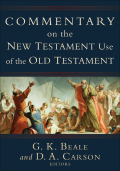 We are very pleased to announce a new partnership with Baker Academic to bring new commentaries and reference works to Accordance. The first confectionary delight served up by this partnership is available right now: The Commentary on the New Testament Use of the Old Testament by G. K. Beale and D. A. Carson. The next batch of goodies will include two other commentaries: The Baker Exegetical Commentary on the New Testament series and the New Testament Commentary series by William Hendricksen and Simon J. Kistemaker. While those others are still cooking, let’s take a moment to savor the sweetness of the Beale & Carson Commentary.
We are very pleased to announce a new partnership with Baker Academic to bring new commentaries and reference works to Accordance. The first confectionary delight served up by this partnership is available right now: The Commentary on the New Testament Use of the Old Testament by G. K. Beale and D. A. Carson. The next batch of goodies will include two other commentaries: The Baker Exegetical Commentary on the New Testament series and the New Testament Commentary series by William Hendricksen and Simon J. Kistemaker. While those others are still cooking, let’s take a moment to savor the sweetness of the Beale & Carson Commentary.
I’ve been excited about the prospect of getting the Commentary on the New Testament Use of the Old Testament ever since it was first released in print. I haven’t been the only one, either: it has consistently been among the commentaries most frequently requested by our users. If you’ve ever read a New Testament quotation of an Old Testament passage, then been puzzled when you read the quoted passage in context, you’ll understand why. The New Testament writers quoted their sources far more freely than we are often comfortable with, especially given our expectations of scientific precision and journalistic accuracy. Sometimes they quote a passage and interpret it in a way that seems questionable, and we struggle to understand what is going on.
For example, Paul quotes Psalm 68:18 in Ephesians 4:8, yet changes personal pronouns from “you” to “he” and speaks of giving gifts to people rather than receiving gifts from them. What are we to make of such changes? How would people react to us if we changed the wording of Biblical passages to suit our arguments?
For this passage, as well as every other New Testament quotation of the Old Testament, the Beale & Carson commentary examines the New Testament context in which the quotation is used, the original context of the quoted passage in the Old Testament, how the quoted passage was understood by contemporary Jewish interpreters, and any text-critical issues which may be affecting how the original passage was quoted. All of these factors are then taken into account to assess and summarize how the quotation is being made. Finally, the theological implications of the author’s use of that quotation are considered.
In a case like Ephesians 4:8, there is actually a surprising amount of information to unravel. For example, one Greek manuscript of Psalm 68:18 actually changes some of the pronouns from “you” to “he,” just as Paul did. That may indicate that Paul was quoting from a particular textual tradition that had already made this change, but it may also be that a scribe copying the Greek of Psalm 68:18 may have accidentally changed the pronouns because of his familiarity with Paul’s quotation in Ephesians 4:8! Similarly, Jewish interpretations of Psalm 68:18 show an interesting parallel to Ephesians 4:8 in that they view Moses as the one ascending to heaven to receive the law and in turn give it to the Israelites. Was Paul aware of these interpretations and deliberately arguing that it was Christ rather than Moses who ascended in order to give the Spirit rather than the law?
Of course, you’ll have to read the commentary to see what the authors conclude about this passage, but I think you can see from this example why a Commentary on the New Testament Use of the Old Testament is so helpful and in demand.
The Beale & Carson commentary is currently on sale, so be sure to get it while it’s fresh out of the oven.

